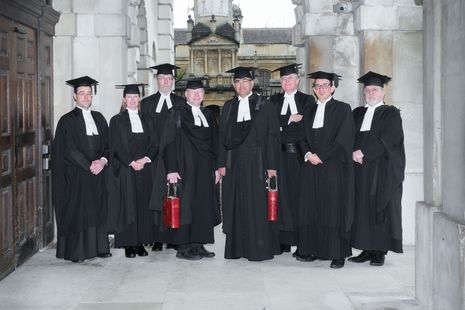Meet the Proctors: on traditions and graduation tips
Alex Corbould asks the Proctors key questions as graduation season approaches

For anyone who doesn’t know, what is a proctor?
The two Proctors (designated Senior and Junior, but otherwise equal) are University officers elected each October by the Regent House, the University’s governing body. While the term ‘Rector’ was used in the earliest statutes, ‘Proctor’ comes from the Latin procurator and recalls the historically extensive administrative, disciplinary, and representative functions of the Proctors. The Proctors are still the principal officers of the Regent House and represent the wider academic community on formal occasions.
When was the role established, and how has it evolved over time?
We are but the latest in a line stretching back to the earliest days of the University. We have a more or less complete list since 1314, but before that records are not so good. In the past, Proctors arranged teaching and exams, kept good order, collected fees, and did just about everything that had to be done to make the University work.
“We hope to serve as symbols of continuity in a Collegiate community that is still self-governing and democratic in its pursuit of knowledge”
Modern administration does most of this now, but we still oversee graduations (Congregations) and other meetings of the Regent House, and we represent the Regent House as members of the Board of Scrutiny and other Committees, and as observers at meetings of the University Council.
Our role in protecting good order and upholding (lawful) free speech includes attending events and delivering contributions to University Discussions on behalf of those who cannot attend. We monitor exam conditions, registered University clubs and societies and the Student Union, and we serve on student discipline Appeal Committees. We attend University Sermons and also some civil ceremonial occasions, such as Remembrance Day and the Cambridgeshire Justice Service.
Do you have a favourite anecdote involving the proctors of the past?
A few years ago, the memorial service for a former Proctor heard how he had gone ‘walking’ in the City with his two Constables at the start of the academic year. He met his son, who was an undergraduate but who was not wearing his gown, which was still obligatory at night for junior members out in public until the 1960s. Raising his cap, the Proctor asked “Good evening Sir, are you a member of the University?” – “Don’t be b****y silly Dad, you know perfectly well I am!” to which he replied, raising his cap again: “Very well Sir, your name and College please, you are fined 6s and 8d!”
Is it challenging to combine preservation of the traditions with adaptation to the present?
Tradition remains an important part of the University’s identity; but the modern academic environment demands transparency, inclusivity, and professionalisation, especially in areas like welfare and procedural fairness. The Proctors have altered their roles as the University has changed—Cambridge is always evolving and innovating, despite an apparently unchanging surface. We hope to serve as symbols of continuity in a Collegiate community that is still self-governing and democratic in its pursuit of knowledge.
“Graduations are among the best moments, because they are a joyous celebration of students’ academic journeys”
How do you become a proctor?
You can’t just apply. The Proctors are nominated by two of the colleges each year according to a 33-year cycle. You must have been a Senate member for at least three years and be resident in or near Cambridge, but beyond that colleges select their nominees differently: one of us was chosen by an election in college; the other was just approached and ‘volunteered’. If you show an interest when it’s your college’s turn, you may get the job. Many Proctors have been drawn from the ranks of Praelectors, the college officers who present you for admission to degree at graduation, and the reverse is also true.
How much time do you spend in your capacity as proctors, and how much time can you devote to your academic interests?
On average, we probably spend about eight hours per week on proctorial duties, on top of our College and University obligations during term, though the role can demand much more time at certain points in the year. Serving part-time over three years – as Pro-Proctor, Proctor, and Deputy Proctor – not only affords advantages in terms of building knowledge, contacts, and experience but also means that we can share the time commitment between members of the team.
Which of your duties is the most rewarding?
Working in a team and contributing to parts of the University’s work we would not otherwise encounter are definitely satisfying. Our duties take us outside our colleges and departments, to work with the Chancellor and Vice-Chancellor, members of the Council and Heads of House, but also with the Student Union, clubs and societies and, more generally, with students and colleagues around the University and its colleges. Graduations are among the best moments, because they are a joyous celebration of students’ academic journeys.
Which of the proctors’ historic duties do you wish you still had?
Well, perhaps not patrolling the city on wet and cold nights! Inspecting the stallholders at markets and fairs and checking their goods for quality might have been interesting work. At one point in history, we were even intercepting people trying to take loads of price-controlled candles out of the town to sell elsewhere at a profit.
What is your best tip for a graduand looking to get the most out of their day?
Enjoy sharing the experience with loved ones and friends in college, and reflect on how far you’ve come and what you have achieved. The ceremony is formal, but it is also personal and focused.
Finally, remember that your membership of the University and your college doesn’t end as you walk out of the Senate-House…
 News / Colleges charge different rents for the same Castle Street accommodation2 March 2026
News / Colleges charge different rents for the same Castle Street accommodation2 March 2026 News / King’s hosts open iftar for Ramadan3 March 2026
News / King’s hosts open iftar for Ramadan3 March 2026 Theatre / Lunatics and leisure centres 4 March 2026
Theatre / Lunatics and leisure centres 4 March 2026 News / Angela Merkel among Cambridge honorary degree nominees27 February 2026
News / Angela Merkel among Cambridge honorary degree nominees27 February 2026 News / News in Brief: waterworks, wine woes, and workplace wins 1 March 2026
News / News in Brief: waterworks, wine woes, and workplace wins 1 March 2026








